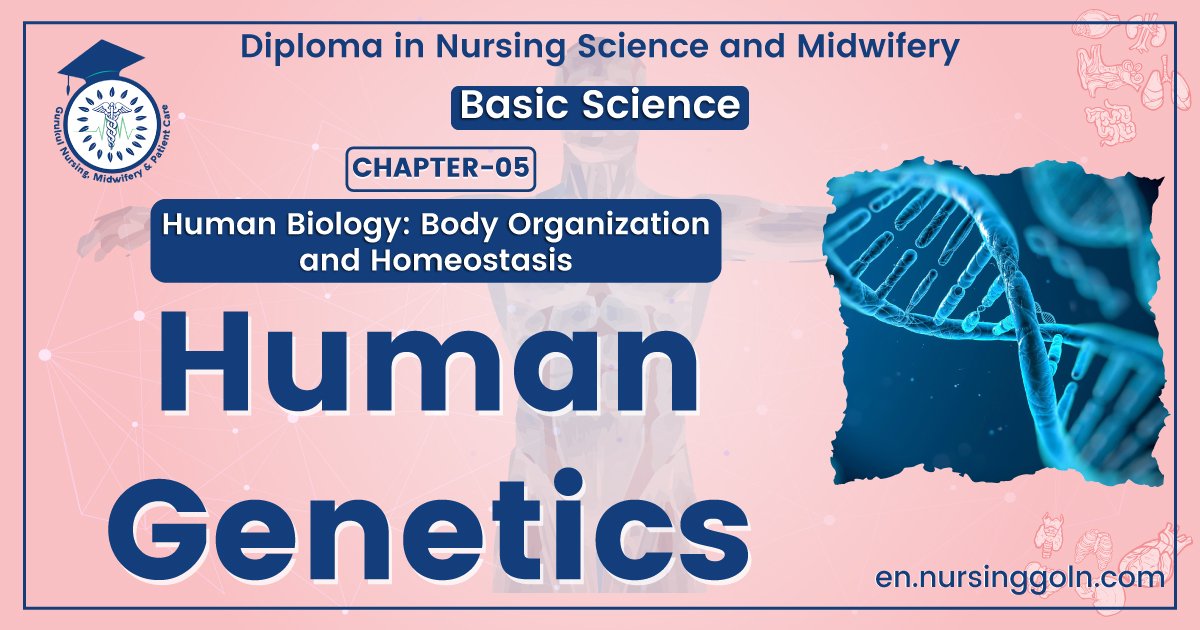Human Genetics – Introduction to fundamental concepts of Biological Science including the organization and common characteristics of living matters, cell structures and functions, food production by photosynthesis, harvesting energy, mechanism of cells reproduction, genetics, evolutions, and Human Biology. Introduction to general chemistry including basic concepts about matter, atomic structure, chemical bonds, gases, liquid, and solids, solutions, chemical reactions, acid, bases, and salt;
organic and biochemistry including hydrocarbons and their derivatives, carbohydrates, lipids, proteins, enzymes, vitamins, and minerals, nucleic acids; principles of physics and applications to nursing including gravity and mechanics, pressure, heat and electricity; nuclear chemistry and nuclear physics, effects of radiation on human beings, and protection and disposal. The aim of the course is to acquire knowledge and skills in general biological science, general chemistry and physics.
Human Genetics
Human genetics is the study of the human genome and how genes are transmitted through generations. The human genome consists of 23 pairs of chromosomes (22 pairs of homologous chromosomes and one pair of sex chromosomes), each containing genes that code for proteins within the cell.
or
Human genetics is the study of inheritance as it occurs in human beings. Human genetics encompasses a variety of overlapping fields including:
- Classical genetics,
- Cytogenetics,
- Molecular genetics,
- Biochemical genetics,
- Genomics,
- Population genetics,
- Developmental genetics,
- Clinical genetics, and
- Genetic counseling

Branches of Human Genetics:
1. Classical or formal genetics – the study of the transmission of single genes within families and the analysis of more complex types of inheritance.
2. Clinical genetics – the diagnosis, prognosis and, in some cases, the treatment of genetic diseases.
3. Genetic counseling – an important area within clinical genetics involving the diagnosis, risk assessment, and interpersonal communication.
4. Cancer genetics – the study of genetic factors in inherited and sporadic cancer.
5. Cytogenetics – the study of chromosomes in health and disease.
6. Biochemical genetics – the biochemistry of nucleic acids and proteins including enzymes.
7. Pharmacogenetics – how genes govern the absorption, metabolism and disposal of drugs and untoward reactions to them.
8. Molecular genetics – the molecular study of genetics including particularly DNA and RNA.
9. Immunogenetics – the genetics of the immune system including blood groups, HLA, and the immunoglobulins.
10. Behavioral genetics – the study of genetic factors in behavior in health and disease including mental retardation and mental illness.
11. Population genetics – the study of genes within populations including gene frequencies, the gene pool, and evolution.
12. Reproductive genetics –– the genetics of reproduction including genes and chromosomes in germ cells and the early embryo.
13. Developmental genetics – the genetics of normal and abnormal development including congenital malformations (birth defects). (Cancer genetics- The study of the genetic factors in inherited and sporadic cancer)
14. Eco-genetics – the interaction of genetics with the environment.
15. Forensic genetics – the application of genetic knowledge, including DNA, to legal matters.
Roles of Genetics in Human Welfare
Genetics is a modern and applicable branch of biology. It has much importance in human velfare. Such as-
- Genetics provides explanations of the mechanism of heredity, variation and evolution.
- Applying knowledge of genetics through hybridization methods, high yielding varieties of crop, developed varieties of poultry, dairy and fishes have produced.
- The actual reasons and treatments of some genetic diseases such as colour-blindness, hemophilia, albinism etc. have been determinate by the knowledge of genetics.
- Diseases resistance and high yielding varieties of crops have developed through the application of genetic engineering technology.
- Genetic engineering technology also used to production of life saving medicine, vaccine, enzymes, hormones etc.
- Genetic fingerprint technique is used to identify the criminals and to determine the paternity of the child
- In the light of knowledge of genetics it is possible to produced cloned animals from the diploid somatic cells.

